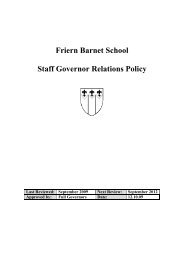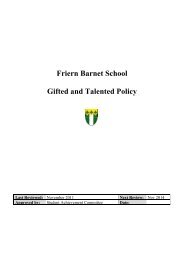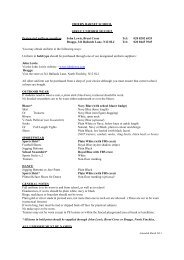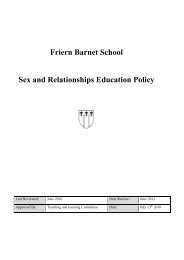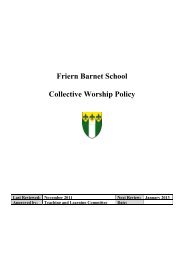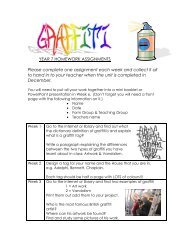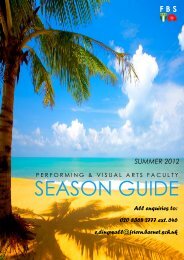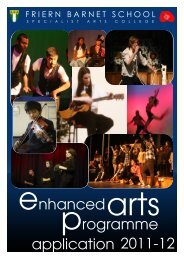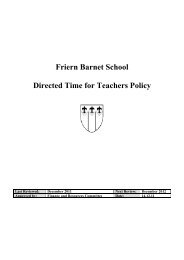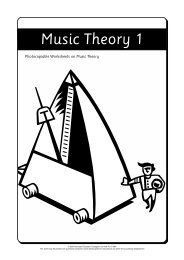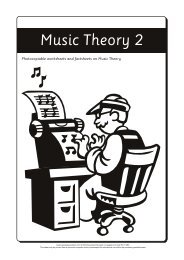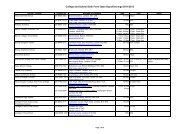Ofsted Report November 2007 - Friern Barnet School
Ofsted Report November 2007 - Friern Barnet School
Ofsted Report November 2007 - Friern Barnet School
Create successful ePaper yourself
Turn your PDF publications into a flip-book with our unique Google optimized e-Paper software.
<strong>Friern</strong> <strong>Barnet</strong> <strong>School</strong><br />
Inspection report<br />
Unique Reference Number 101345<br />
Local Authority<br />
<strong>Barnet</strong><br />
Inspection number 307659<br />
Inspection dates 28 - 29 <strong>November</strong> <strong>2007</strong><br />
<strong>Report</strong>ing inspector<br />
Angela Corbett<br />
This inspection of the school was carried out under section 5 of the Education Act 2005.<br />
Type of <strong>School</strong><br />
Comprehensive<br />
<strong>School</strong> category<br />
Community<br />
Age range of pupils 11-16<br />
Gender of pupils<br />
Mixed<br />
Number on roll<br />
<strong>School</strong> 769<br />
Appropriate authority<br />
The governing body<br />
Chair<br />
Ms Margaret Johnson<br />
Headteacher<br />
Mr Jeremy Turner<br />
Date of previous school inspection 26 April 2004<br />
<strong>School</strong> address<br />
Hemington Avenue<br />
<strong>Friern</strong> <strong>Barnet</strong><br />
London<br />
N11 3LS<br />
Telephone number 020 8368 2777<br />
Fax number 020 8368 3208<br />
Age group 11-16<br />
Inspection Date(s) 28 - 29 <strong>November</strong> <strong>2007</strong><br />
Inspection Number 307659
Inspection <strong>Report</strong>: <strong>Friern</strong> <strong>Barnet</strong> <strong>School</strong>, 28 and 29 <strong>November</strong> <strong>2007</strong><br />
(c) Crown copyright <strong>2007</strong><br />
Website: www.ofsted.gov.uk<br />
This document may be reproduced in whole or in part for non commercial educational purposes, provided that the<br />
information quoted is reproduced without adaptation and the source and date of publication are stated.<br />
Further copies of this report are obtainable from the school. Under the Education Act 2005, the school must provide a<br />
copy of this report free of charge to certain categories of people. A charge not exceeding the full cost of reproduction<br />
may be made for any other copies supplied.
Inspection <strong>Report</strong>: <strong>Friern</strong> <strong>Barnet</strong> <strong>School</strong>, 28 and 29 <strong>November</strong> <strong>2007</strong> 3 of 11<br />
Introduction<br />
The inspection was carried out by one of Her Majesty's Inspectors, one Additional Inspector seconded to Her Majesty's<br />
Inspectorate and two Additional Inspectors.<br />
Description of the school<br />
The majority of pupils at <strong>Friern</strong> <strong>Barnet</strong> <strong>School</strong> live locally. They come from a wide range of ethnic backgrounds, with the<br />
largest two groups being two fifths of pupils of White British origin and one sixth from other White backgrounds. A<br />
substantial number of pupils are refugees or asylum seekers. Almost half of the pupils speak a first language other than<br />
English, of whom over 30 are at early stages of learning English. Just under one third of pupils are entitled to free<br />
school meals, this is well above average. Pupils' attainment on entry to the school is below average; in recent years, it<br />
has been higher for boys than for girls. The proportion of pupils with learning difficulties or disabilities is higher than in<br />
most schools. The number of pupils with statements of special educational need is just above average. An inclusion<br />
centre forms part of the school. The school gained specialist status in performing arts in 2004.<br />
Key for inspection grades<br />
Grade 1<br />
Grade 2<br />
Grade 3<br />
Grade 4<br />
Outstanding<br />
Good<br />
Satisfactory<br />
Inadequate<br />
Document reference number: HMI 2507 11 December <strong>2007</strong>
Inspection <strong>Report</strong>: <strong>Friern</strong> <strong>Barnet</strong> <strong>School</strong>, 28 and 29 <strong>November</strong> <strong>2007</strong> 4 of 11<br />
Overall effectiveness of the school Grade: 2<br />
This is a good school that meets the needs of its diverse range of pupils, some of whom enter the school with little<br />
spoken English. Pupils make good progress in relation to their low starting points. In <strong>2007</strong>, the GCSE results rose<br />
substantially and are now close to the national average. In this very caring school, pupils' personal development and<br />
well-being are good. Pupils greatly increase their self-confidence and social skills. They get on well together and feel<br />
safe. They enjoy school and the wide range of performing arts opportunities it offers. They speak of the school with<br />
pride.<br />
The outstanding leadership of the headteacher has created a shared vision of success that has capitalised on the<br />
expertise of the staff and brought about significant improvements in a short time. Leadership and management are<br />
good overall. Self-evaluation involves staff well, is accurate and links clearly to strategic planning. Significant changes in<br />
the way the school is led and managed have improved pupils' progress and behaviour, and the curriculum. The school<br />
now works with other schools and local colleges to offer a wider variety of courses that match pupils' needs well. The<br />
rapid improvement in the school's learning culture since the appointment of the headteacher in September 2006 is the<br />
consistent message expressed by staff, pupils and governors. The increased number of pupils applying to join the<br />
school reflects its growing reputation in the local community. The recent improvements and the effectiveness of<br />
leadership and management demonstrate a good capacity for continued improvement.<br />
Effectively targeted support in Years 9 and 11 contributed to pupils' improved results in <strong>2007</strong>. Nevertheless, progress is<br />
variable across the school. It is linked to the quality of teaching and the use of assessment. While progress is good in<br />
English and science, it is satisfactory in mathematics. Teaching is good. In most lessons, pupils participate actively in<br />
challenging work that helps them learn well. In many lessons, but not all, they are clear about how well they are doing<br />
and what they need to do to improve. Sometimes the quality of teaching is not as good and activities do not meet the<br />
needs of all pupils. Information about pupils with particular needs is used well by some teachers to enable the pupils to<br />
take a full part in activities, but this practice is not consistent. The use of assessment information and targets to track<br />
pupils' progress and to help them all do better varies across subjects and year groups. The school has rightly set the<br />
use of assessment and tracking as priorities for improvement and put in place measures to achieve this.<br />
The arts specialism is making a good impact on the curriculum, approaches to teaching and learning, links with local<br />
schools and pupils' participation. Pupils talk of everyone being encouraged to participate in performance activities in and<br />
out of lessons and how this has improved their self-confidence and social skills.<br />
What the school should do to improve further<br />
● Improve progress and attainment, particularly in mathematics.<br />
● Raise the quality of teaching and learning so that it is consistently good, to enhance the progress of all pupils<br />
throughout the school.<br />
● Improve the impact of the monitoring of pupils' progress against their targets by showing them more consistently how<br />
to improve.<br />
Document reference number: HMI 2507 11 December <strong>2007</strong>
Inspection <strong>Report</strong>: <strong>Friern</strong> <strong>Barnet</strong> <strong>School</strong>, 28 and 29 <strong>November</strong> <strong>2007</strong> 5 of 11<br />
Achievement and standards Grade: 2<br />
Achievement and standards are good. Pupils make good progress from their below average standards on entry. The<br />
standards they reach improved greatly at Key Stage 4 in <strong>2007</strong>, where the percentage attaining five or more grades A*<br />
to C at GCSE reached close to the national average. Pupils make good progress in English and science, but in<br />
mathematics they make satisfactory progress. The school put in place effective support in Years 9 and 11 that<br />
contributed to the substantial improvements in <strong>2007</strong>. The school has met its challenging targets at Key Stage 3 and 4,<br />
but the specialist school targets set four years ago were not met.<br />
In <strong>2007</strong>, a group of girls underachieved, including some lower attainers. The school has now introduced courses that<br />
better meet these pupils' needs, which have contributed to current pupils making improved progress. Groups of pupils<br />
who had low attainment in <strong>2007</strong> are doing better this year. All groups are making at least satisfactory progress. Pupils<br />
with learning difficulties and/or disabilities make good progress.<br />
Personal development and well-being Grade: 2<br />
Pupils' personal development and well-being are good. Their spiritual, moral, social and cultural development is good.<br />
Pupils show respect to each other and behaviour around the school is good overall. Relationships between staff and<br />
pupils are good. Pupils feel safe and know who to go to if they need support. They enjoy school and the range of<br />
activities it offers. Aided by the performing arts specialism, they work cooperatively in discussions and groups where<br />
they develop good social skills that prepare them well for the future. Pupils have a strong sense of community and<br />
willingly take on additional responsibilities such as helping younger pupils through peer mentoring and acting as buddies<br />
for new pupils. They contribute well to the local community, particularly through the performing arts specialism. Many<br />
are involved in performances, sports events and projects with primary school pupils. The '<strong>School</strong> Parliament' is<br />
beginning to provide a voice for pupils. It was recently successful in obtaining a grant to establish a brand new fitness<br />
studio. These experiences, supported by sound careers advice, prepare pupils well for the world of work. Pupils are very<br />
aware of the need to adopt healthy lifestyles and like the free salad options for school lunches. Peer- and<br />
self-evaluation, for instance in drama and dance, develop their skills in understanding how they can progress.<br />
Attendance is below the national average. New systems for improving attendance and punctuality are in their early<br />
stages and have started to have an impact through the consistent application of rewards and sanctions, which pupils<br />
speak about positively.<br />
Quality of provision<br />
Teaching and learning Grade: 2<br />
Teaching and learning are good. The drive to improve teaching and learning is evident in how teachers share ideas with<br />
each other and seek out new approaches. There is a strong emphasis on creating a positive climate for learning and<br />
ensuring that interactions between teachers and pupils are constructive. For example, in a modern foreign languages<br />
lesson, the teacher encouraged collaboration by saying 'this is a team effort - let's all help'. Across the school, teaching<br />
involves pupils in active learning and using performing arts skills. In the most effective lessons, good questioning<br />
challenges pupils to think for themselves and apply what they learn through lively, purposeful activities. Information and<br />
communication technology (ICT) helps to make lessons come alive where teachers are confident in its use. The school<br />
rightly recognises that good practice in using assessment does not feature in all lessons and has included it as a target<br />
Document reference number: HMI 2507 11 December <strong>2007</strong>
Inspection <strong>Report</strong>: <strong>Friern</strong> <strong>Barnet</strong> <strong>School</strong>, 28 and 29 <strong>November</strong> <strong>2007</strong> 6 of 11<br />
in the school improvement plan. Pupils make good progress when they are clear about how well they are doing and<br />
what they need to do to improve. This was seen in art where pupils were helped very creatively using differently<br />
coloured hands that showed the assessed level on one side and, on the reverse, how to move to the next level. In some<br />
lessons, where the work does not meet all pupils' needs and teachers do not monitor carefully enough how well pupils<br />
are doing, they make less progress. Information about pupils with particular needs is used well by some teachers so<br />
they can take a full part in activities, though this practice is not consistent in all lessons. The school has in place a wide<br />
range of additional support for pupils; they make good progress when it is well directed to meet their needs. Vibrant<br />
displays around the school set the scene for high expectations and enhance pupils' learning as well as celebrating their<br />
work; particularly good examples were seen in art and technology.<br />
Curriculum and other activities Grade: 2<br />
The quality of the curriculum is good. It is greatly enriched by the performing arts specialism. In partnership with other<br />
schools and a local college, the school has established a successful vocational performing arts course. The results for<br />
the first pupils to complete this programme are outstanding. Pupils in Year 9 are also following a GCSE in expressive<br />
arts this year.<br />
The school has recently taken steps to ensure that the curriculum helps all learners, including the gifted and talented<br />
and those with learning difficulties and/or disabilities, to progress and perform well. For example, in Year 10, pupils are<br />
able to study either three separate sciences at GCSE or the double science award. They can also choose from a range of<br />
vocational options for two afternoons a week at local colleges. Beauty therapy courses have been developed on the<br />
school site and pupils learn construction skills through a mobile centre which visits regularly. There is evidence that<br />
these changes are increasing motivation for those who have achieved less well than others in previous years. One pupil<br />
said how much he was enjoying his course in motor vehicle studies at the local college and that it linked well to his<br />
career choice.<br />
Learning is enriched by a wide range of activities in and outside lessons, including sports, a film-making club and events<br />
led by professional artists. The school's enrichment curriculum enables pupils to access activities such as first aid, an<br />
additional language, swimming or sports leaders' awards. There are good opportunities for pupils to work with the local<br />
community. Pupils in Year 9 ran a story-telling project for a local special school. Workshops on life skills supplement the<br />
personal, social and health education programme and help pupils develop their study skills and prepare for the future.<br />
The school is currently mapping how ICT and citizenship are provided across subjects to make sure that they are<br />
developed as fully as possible.<br />
Care, guidance and support Grade: 2<br />
The school provides good care, guidance and support. It is a very caring school in which staff know pupils well. They<br />
are thoroughly committed to promoting pupils' well-being and achievement. Safeguarding requirements are met. Pupils<br />
find the information and experiences they are given very helpful in making choices for their future. Staff have worked<br />
well to reduce instances of verbal bullying recognised in pupil surveys and provide good support for pupils. The<br />
Fantome Centre provides a safe and caring environment for supporting pupils with a wide range of social, emotional and<br />
academic needs. Pupils speak highly of it and choose sensibly to avail themselves of it. Pupils with learning difficulties<br />
and/or disabilities are supported well in their personal development. Pupils at early stages of learning English are<br />
supported very well to make a smooth transition into the school, ably assisted by pupil buddies. Their language level is<br />
assessed and monitored well. Nevertheless, assessment is not used well to provide targets across subjects for pupils<br />
who join the school without Key Stage 2 results. The performing arts specialism and good quality care have contributed<br />
well to the rise in pupils' self-confidence and social skills, which has enabled many pupils at risk of disaffection to<br />
Document reference number: HMI 2507 11 December <strong>2007</strong>
Inspection <strong>Report</strong>: <strong>Friern</strong> <strong>Barnet</strong> <strong>School</strong>, 28 and 29 <strong>November</strong> <strong>2007</strong> 7 of 11<br />
engage well in school.<br />
Pupils receive termly reports on their attainment, attitude to learning and target level or grade in each subject. The<br />
provision of such targets contributes effectively to pupils' progress. The school has rightly identified as a priority the<br />
need for greater coherence and efficiency in its tracking and target setting systems, and has set in place procedures for<br />
achieving this. In the best cases, assessment is used well to track pupils' progress against targets, inform teaching, and<br />
give pupils ways to improve but this is not consistent. There is room for targets, such as those set at academic review<br />
day, to provide a sharper focus on subject performance against which progress can be monitored more regularly.<br />
Leadership and management Grade: 2<br />
Leadership and management are good. The headteacher's outstanding leadership has empowered the development of<br />
increasingly strong leadership at all levels and a shared vision for the school. The senior leadership team have<br />
developed into an effective unit since the headteacher's appointment. Responsibilities are now clear. A parent<br />
commented 'the headteacher is a good motivator and is passionate about the pupils and the school'. Coached by the<br />
headteacher, staff have directed their energies into raising standards and increasing the rate at which pupils make<br />
progress. This has contributed to the much-improved GCSE examination results in summer <strong>2007</strong>. New rigorous systems<br />
for monitoring and evaluating the school's performance have involved staff and led to a shared understanding of<br />
accountability for all. Strengths and areas for development are accurately diagnosed and translated into challenging<br />
action plans. The school's initiatives to improve the consistency of the quality of teaching and learning and the quality of<br />
leadership and management of individual subject areas are proving successful in most areas. Governors are committed<br />
and know the school well. They play an active role in school, participate in self-evaluation and obtain direct information<br />
through their links with staff. Nevertheless, there is room for a more rigorous approach to ensuring that all statutory<br />
requirements are met in full. From a position of deficit, finances and resources have been managed efficiently. A strong<br />
team of highly committed associate staff provide effective administrative and site support for pupils' care and learning.<br />
The school takes good advantage of the expertise of external agencies to enhance pupils' well-being.<br />
Document reference number: HMI 2507 11 December <strong>2007</strong>
Inspection <strong>Report</strong>: <strong>Friern</strong> <strong>Barnet</strong> <strong>School</strong>, 28 and 29 <strong>November</strong> <strong>2007</strong> 8 of 11<br />
Any complaints about the inspection or the report should be made following the<br />
procedures set out in the guidance 'Complaining about inspections', which is available<br />
from <strong>Ofsted</strong>'s website: www.ofsted.gov.uk.
Inspection <strong>Report</strong>: <strong>Friern</strong> <strong>Barnet</strong> <strong>School</strong>, 28 and 29 <strong>November</strong> <strong>2007</strong> 9 of 11<br />
Inspection judgements<br />
Key to judgements: grade 1 is outstanding, grade 2 good, grade 3 satisfactory, and<br />
grade 4 inadequate<br />
<strong>School</strong><br />
Overall<br />
Annex A<br />
Overall effectiveness<br />
How effective, efficient and inclusive is the provision of education, integrated care<br />
and any extended services in meeting the needs of learners<br />
2<br />
Effective steps have been taken to promote improvement since the last inspection<br />
Yes<br />
How well does the school work in partnership with others to promote learners' well-being 2<br />
The capacity to make any necessary improvements 2<br />
Achievement and standards<br />
How well do learners achieve 2<br />
The standards 1 reached by learners 3<br />
How well learners make progress, taking account of any significant variations between groups of<br />
learners<br />
2<br />
How well learners with learning difficulties and disabilities make progress 2<br />
Personal development and well-being<br />
How good is the overall personal development and well-being of the learners 2<br />
The extent of learners' spiritual, moral, social and cultural development 2<br />
The extent to which learners adopt healthy lifestyles 2<br />
The extent to which learners adopt safe practices 2<br />
How well learners enjoy their education 2<br />
The attendance of learners 3<br />
The behaviour of learners 2<br />
The extent to which learners make a positive contribution to the community 2<br />
How well learners develop workplace and other skills that will contribute to their future economic<br />
well-being<br />
2<br />
The quality of provision<br />
How effective are teaching and learning in meeting the full range of learners' needs 2<br />
How well do the curriculum and other activities meet the range of needs and interest<br />
of learners<br />
2<br />
How well are learners cared for, guided and supported 2<br />
1<br />
Grade 1 - Exceptionally and consistently high; Grade 2 - Generally above average with none significantly below<br />
average; Grade 3 - Broadly average to below average; Grade 4 - Exceptionally low.<br />
All white boxes must be completed. The grey boxes are used wherever the inspection team has sufficient evidence to<br />
come to a secure judgement.<br />
2<br />
IE - denotes that insufficient evidence was available to inspectors for a judgement to be made.
Inspection <strong>Report</strong>: <strong>Friern</strong> <strong>Barnet</strong> <strong>School</strong>, 28 and 29 <strong>November</strong> <strong>2007</strong> 10 of 11<br />
Leadership and management<br />
How effective are leadership and management in raising achievement and supporting<br />
all learners<br />
2<br />
How effectively leaders and managers at all levels set clear direction leading to improvement and<br />
promote high quality of care and education<br />
1<br />
How effectively leaders and managers use challenging targets to raise standards 2<br />
The effectiveness of the school's self-evaluation 2<br />
How well equality of opportunity is promoted and discrimination tackled so that all learners<br />
achieve as well as they can<br />
2<br />
How effectively and efficiently resources, including staff, are deployed to achieve value for money 2<br />
The extent to which governors and other supervisory boards discharge their responsibilities 2<br />
Do procedures for safeguarding learners meet current government requirements<br />
Yes<br />
Does this school require special measures<br />
No<br />
Does this school require a notice to improve<br />
No
Inspection <strong>Report</strong>: <strong>Friern</strong> <strong>Barnet</strong> <strong>School</strong>, 28 and 29 <strong>November</strong> <strong>2007</strong> 11 of 11<br />
Annex B<br />
Letter to pupils explaining the findings of the<br />
inspection.<br />
11 December <strong>2007</strong><br />
Dear Children<br />
Inspection of <strong>Friern</strong> <strong>Barnet</strong> <strong>School</strong>, London, N11 3LS<br />
Following our visit to your school we would like to thank you for making us feel welcome and for sharing your views<br />
with us.<br />
We think that <strong>Friern</strong> <strong>Barnet</strong> <strong>School</strong> is a good school, with a positive learning culture where everyone gets on well<br />
together. Both you and your parents agree with this judgement. You are rightly proud of your school. We were<br />
particularly pleased to see how much the GCSE results had improved in <strong>2007</strong>.<br />
We believe that the staff care a great deal about your personal development and are very committed to supporting you<br />
during your time at school. As a result you develop well into self-confident young people. You enjoy school and you<br />
behave well, but your attendance is below the national average. You appreciate the benefits that arise from the<br />
performing arts specialism. Teaching is good and you make good progress in most lessons, particularly when learning is<br />
active, support is well planned and you are shown how to improve. However, your progress is only satisfactory in some<br />
lessons. The range of subjects and courses is good and has increased to better meet your individual needs. The quality<br />
of your work on display around the school is good.<br />
Your headteacher and school leaders provide good leadership that sets a clear vision for the school. The good<br />
leadership and management of the school have brought about many improvements over the last year, which I know<br />
you appreciate.<br />
We have asked the school to:<br />
● improve your progress and attainment, particularly in mathematics<br />
● improve teaching so all of you make even better progress in all lessons<br />
● use checks on your progress and your targets more consistently to show you how to improve.<br />
You can help by working hard, attending well and making the most of the opportunities on offer.<br />
Angela Corbett<br />
Lead Inspector





